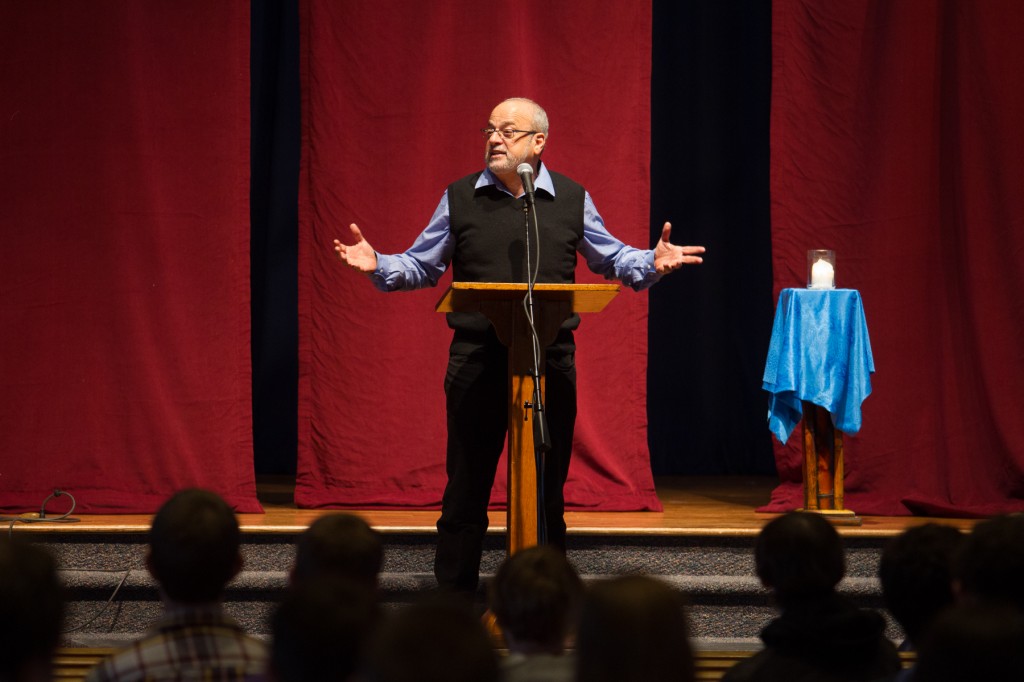Salim Munayer is a citizen of a small nation that casts a giant shadow on the world stage. Small enough to fit four within the borders of Virginia, the modern state of Israel is a land of deep history and intractable conflict.
Munayer’s mosaic of identities gave his four presentations at EMU, Feb. 20-21, the ring of authenticity. Palestinian. Christian. Arab. From a family whose lands were confiscated in 1948. Israeli citizen. Fluent in Arabic, Hebrew, English. Father of four sons. Author of several books. Speaker. College professor. Prophetic voice for reconciliation.
The Christian roots of his family and other Palestinians in the Holy Land extend back to the early years of the church.
U.S. Christians often blind to Palestinian Christians
“We were here for centuries. We kept the holy places. We went through a lot of suffering so pilgrims can come here,” says Munayer of the native Christian peoples. Yet, ironically, “when Western Christians come, they don’t know we exist.”
His life’s journey has been shaped by harsh forces of history, forces that could have turned him into a bitter man. The house and property of Munayer’s father Jacob were seized by Israeli soldiers in 1948. But Jacob later reconciled with one of the Israeli soldiers involved, and he encouraged his son to do the same with their Israeli neighbors.
“During the Yom Kippur War of 1973,” says Munayer, “I, and several friends from the Jewish high school I attended, volunteered at a hospital. Army trucks pulled up. In the back were Egyptian prisoners a few years older than us, missing hands, missing feet, missing arms. As we unloaded them onto stretchers, we asked ourselves, ‘Is there a future for us in the Middle East? Is this our fate, to be casualties of a never-ending cycle of war?’”
The clash of historical narratives precedes the clash of armies. Shared understandings that give meaning and purpose to a people can also create walls of suspicion and hatred toward “the other, the enemy.”
Love of neighbor as key principle for all in Middle East
Munayer is committed to the powerful narrative of a Jew living under oppressive occupation, who taught love rather than hatred for one’s enemies and who chose to let go of honor and power to achieve reconciliation.
He quotes the scriptural admonition: “How can we say that we love God whom we don’t see, but we hate the neighbor that we do see, our brother and sister?”
Munayer is committed to peacemaking in the way of Jesus who “called us to pursue – to chase – peace. In the Hebrew Biblical language, peace is something that you work for, you labor for, you pursue, you chase,” says Munayer.
In 1990, Munayer helped found Musalaha (an Arabic word for reconciliation), a ministry that brings together Palestinian Christians with messianic Jews (who do not identify as Christian but accept Jesus as messiah and savior) to hear each other’s stories, get to know each other, gradually overcome their mutual fears, and build the kind of relationships that are the only basis for a lasting peace.
An initial challenge for fledgling Musalaha was finding a neutral place to meet, far from the maddening crowds. Enter the Negev desert, silent and intimidating. Add a caravan of 15 camels, each bearing two uneasy riders, a young Jew and a Palestinian. After three days traveling together, “the other” became “the brother” as barriers to conversation evaporated under the desert sun and the embracing silence.
Finding true identities as children of God
By the end of the desert encounter, the labels of Israeli and Palestinian fell away. “In a process of identity transformation, the participants claim their truer identities – children of God, open to listen, open to embrace,” says Munayer.
The hard work of true reconciliation meets “the justice the Palestinians are looking for and the hope the Jews are seeking.”
A recently launched program of Musalaha attempts to bridge the deep divides separating Christian, Jewish and Muslim neighbors. Shared moral values drawn from the three monotheistic religions, as well as the biblical values of tolerance, peace and love, inform these bridge-building projects of reconciliation.
Munayer closed his final chapel talk with the story of Egyptian and Bedouin guides who pulled him aside before their climb up Mount Sinai. “Please tell us something. When we heard you were bringing a group of Israeli and Palestinian youth out here to the desert, we said to ourselves, ‘This is not a good idea. They will be arguing and shouting at each other all the way up the mountain.’
“But look at them now, all together, working together. Can you tell us – Who is the Jew and who is the Palestinian?”
Munayer’s visit to EMU was part of a two-week circuit that took him to 14 locations and 30 speaking engagements, organized by Eastern Mennonite Missions, based in Salunga, Pa. His four talks at EMU were sponsored by the Eastern Mennonite Seminary, Center for Justice and Peacebuilding, and Center for Interfaith Engagement. Podcast links to two presentations are here and here.
